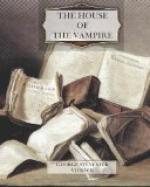As she listened, indignation clouded her forehead, while rising tears of anger and of love weighed down her lashes. She could bear the pitiful sight no longer.
“Child,” she cried, “do you know who your tormentor is?”
And like a flash the truth passed from her to him. A sudden intimation told him what her words had still concealed.
“Don’t! For Christ’s sake, do not pronounce his name!” he sobbed. “Do not breathe it. I could not endure it. I should go mad.”
XXIV
Very quietly, with difficulty restraining her own emotion so as not to excite him further, Ethel had related to Ernest the story of her remarkable interview with Reginald Clarke. In the long silence that ensued, the wings of his soul brushed against hers for the first time, and Love by a thousand tender chains of common suffering welded their beings into one.
Caressingly the ivory of her fingers passed through the gold of his hair and over his brow, as if to banish the demon-eyes that stared at him across the hideous spaces of the past. In a rush a thousand incidents came back to him, mute witnesses of a damning truth. His play, the dreams that tormented him, his own inability to concentrate his mind upon his novel which hitherto he had ascribed to nervous disease—all, piling fact on fact, became one monstrous monument of Reginald Clarke’s crime. At last Ernest understood the parting words of Abel Felton and the look in Ethel’s eye on the night when he had first linked his fate with the other man’s. Walkham’s experience, too, and Reginald’s remarks on the busts of Shakespeare and Balzac unmistakably pointed toward the new and horrible spectre that Ethel’s revelation had raised in place of his host.
And then, again, the other Reginald appeared, crowned with the lyric wreath. From his lips golden cadences fell, sweeter than the smell of many flowers or the sound of a silver bell. He was once more the divine master, whose godlike features bore no trace of malice and who had raised him to a place very near his heart.
“No,” he cried, “it is impossible. It’s all a dream, a horrible nightmare.”
“But he has himself confessed it,” she interjected.
“Perhaps he has spoken in symbols. We all absorb to some extent other men’s ideas, without robbing them and wrecking their thought-life. Reginald may be unscrupulous in the use of his power of impressing upon others the stamp of his master-mind. So was Shakespeare. No, no, no! You are mistaken; we were both deluded for the moment by his picturesque account of a common, not even a discreditable, fact. He may himself have played with the idea, but surely he cannot have been serious.”
“And your own experience, and Abel Felton’s and mine—can they, too, be dismissed with a shrug of the shoulder?”
“But, come to think of it, the whole theory seems absurd. It is unscientific. It is not even a case of mesmerism. If he had said that he hypnotised his victims, the matter would assume a totally different aspect. I admit that something is wrong somewhere, and that the home of Reginald Clarke is no healthful abode for me. But you must also remember that probably we are both unstrung to the point of hysteria.”




